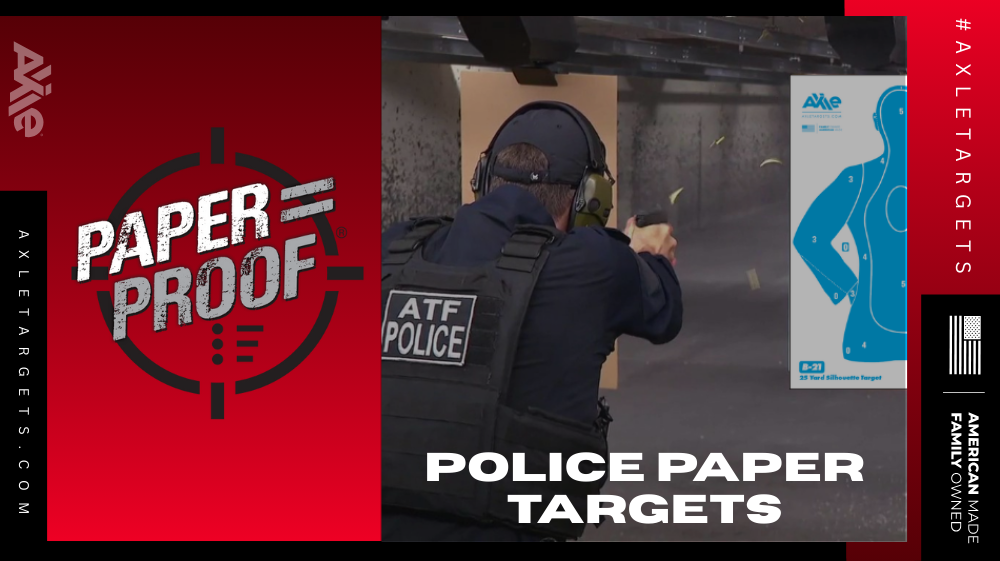Introduction: Ever Wonder What Targets the Police Actually Use?
If you've spent time at a shooting range or browsed targets online, you've probably seen the names B-27, QIT-99, or FBI-Q. But do you know why these targets are used—and more importantly, who uses them?
Law enforcement agencies across the United States rely on standardized paper shooting targets to evaluate the shooting accuracy, speed, and tactical decision-making of officers. These aren’t just any targets—they’re designed to mimic real-life scenarios and emphasize shot placement under pressure.
In this guide, we’re breaking down the most common police qualification paper targets, why they’re used, and how you can incorporate them into your own training regimen. Plus, we’ll show you top-rated targets from Axle Targets that match official law enforcement specs—so you can train like the professionals.
🔫 Why Paper Targets Matter in Police Qualification
Qualification targets are more than just paper—they're tools that law enforcement agencies use to measure vital skills in the field. Every law enforcement officer must qualify with their duty weapon, and the target they use plays a big role in how their performance is judged.
Key Functions of Police Qualification Targets:
-
Accuracy Testing: Targets are sectioned into scoring zones to assess precision.
-
Tactical Training: Shapes mimic human forms for shoot/don’t-shoot decision-making.
-
Standardization: Ensures fair, consistent evaluation across officers and agencies.
-
Legal Compliance: Officers often must qualify using approved target styles set by state or federal standards.
Whether it's the classic B-27 silhouette or the more compact QIT-99, each paper target has a purpose—and it’s not just for punching holes.
🧠 Commonly Used Police Qualification Targets
1. B-27 Target – A Long-Time Law Enforcement Favorite
Used by police departments for decades, the B-27 is a full-sized silhouette target that measures 24" x 36" and features a large scoring area in the torso and head. It's known for its iconic human shape and easy-to-read scoring zones.
Why it's used:
-
Simulates a human torso for real-world engagement training
-
Encourages accurate shot grouping in vital zones
-
Ideal for mid-to-long range handgun training
2. FBI QIT-99 – Compact and Tactical
The QIT-99 is a smaller version of the full-size “Q” target used in FBI and state law enforcement training programs. It focuses on high-value zones and decision-based shooting.
Why it's used:
-
Emphasizes speed and accuracy over broader shot placement
-
Better for indoor ranges and short-distance drills
-
Common in requalification testing and advanced courses
3. B-21 Target – Used in Police Academies
The B-21 target was developed for law enforcement agencies to test both precision and reaction under pressure. Slightly more stylized than the B-27, it focuses on scoring within vital hit areas.
Why it's used:
-
Designed for law enforcement and security force training
-
Encourages accuracy in dynamic shooting environments
-
Popular for both new recruits and experienced officers
🎯 Product Spotlights: Axle Targets That Match Police Standards
Axle Targets offers law-enforcement-quality paper targets designed to meet official specs. These aren't gimmicks—they’re made for shooters who take their training seriously.
Let’s look at three standout options that match what real police use:
🔘 B-21 Target – Full SilhouetteThe B-21 is used in police academies and qualification courses nationwide. This target has a large silhouette with numbered scoring zones across the head and torso, offering realistic feedback on shot accuracy. Features:
Why It's Ideal: |
 |
 |
🔘 FBI QIT-99 TargetIf you're short on range space or want to simulate fast-paced, close-quarters scenarios, the QIT-99 is the one. Its minimal design forces you to shoot smarter—not just faster. Features:
Why It's Ideal: |
🔘 B-27 Reverse TargetThis target flips the traditional black-on-white style, giving you a white silhouette on a black background—enhancing visibility and contrast, especially in low-light shooting. Features:
Why It's Ideal: |
 |
🔍 Pro Tips for Shooting Range & Firearms Qualification
If you're planning to use police-style targets in your own training, here are a few expert tips to maximize your progress:
✅ Don’t Just Shoot—Score Yourself
Use the scoring zones on your target to track progress over time. You’ll see where your groupings fall and where adjustments are needed.
✅ Train Under Stress
Law enforcement qualifications simulate real-life pressure. Add a timer, low light, or movement drills to mimic those conditions.
✅ Mix Up Distances
Start close, then work your way out. Police officers qualify from varying distances—often from 3 to 25 yards.
✅ Use Targets With Purpose
Don’t waste ammo on novelty targets. Stick with proven formats like the B-21, QIT-99, or B-27 to ensure your training is effective and goal-driven.
🧭 Final Thoughts: Train Like the Pros with Axle Targets
If you want to shoot like law enforcement, you’ve got to train like law enforcement. And that starts with using the same paper targets officers are tested on every year.
From the tried-and-true B-21 to the FBI-favored QIT-99, Axle Targets delivers the quality, precision, and realism you need to elevate your training. Whether you're a civilian shooter, security professional, or aspiring officer, using police-grade targets helps build the discipline and accuracy that save lives.
👉 Ready to take your range time to the next level?
Explore these top picks at AxleTargets.com and experience why professionals trust our targets for their most important shots.


